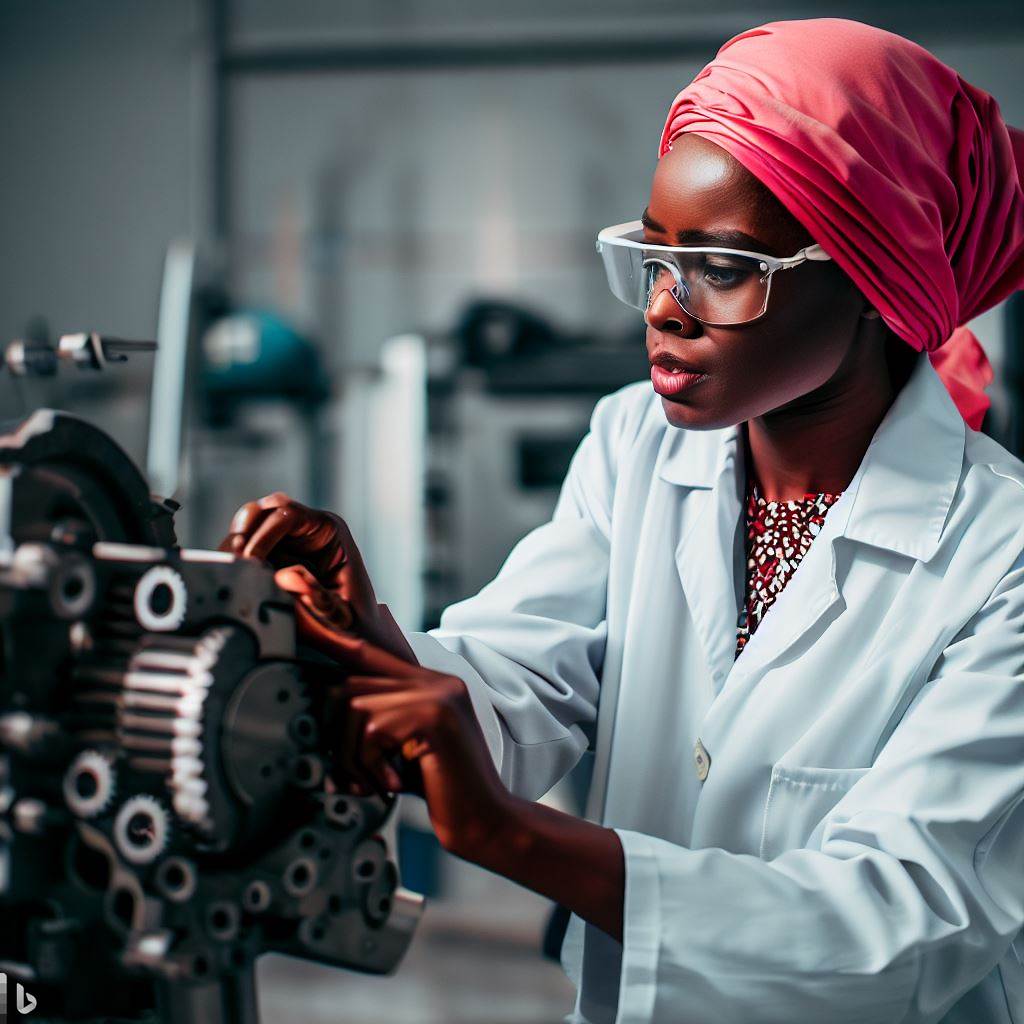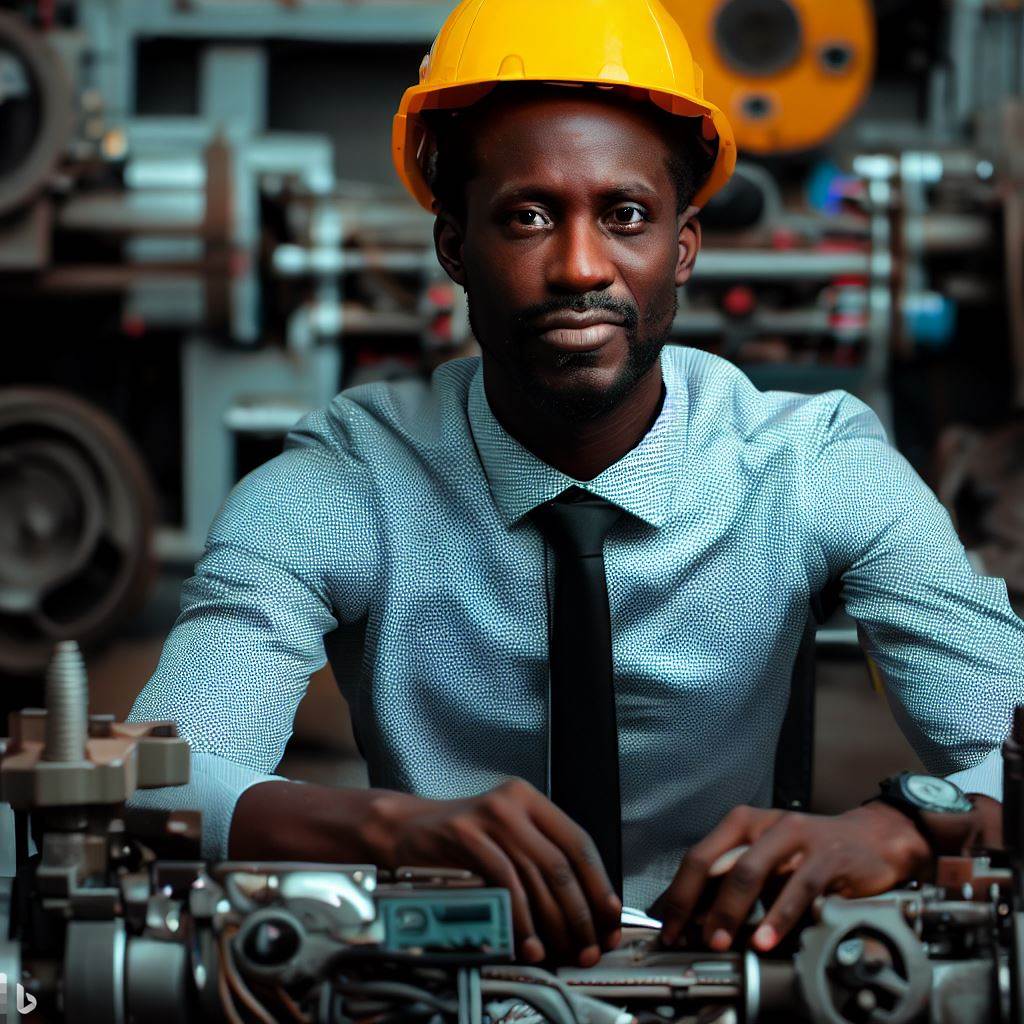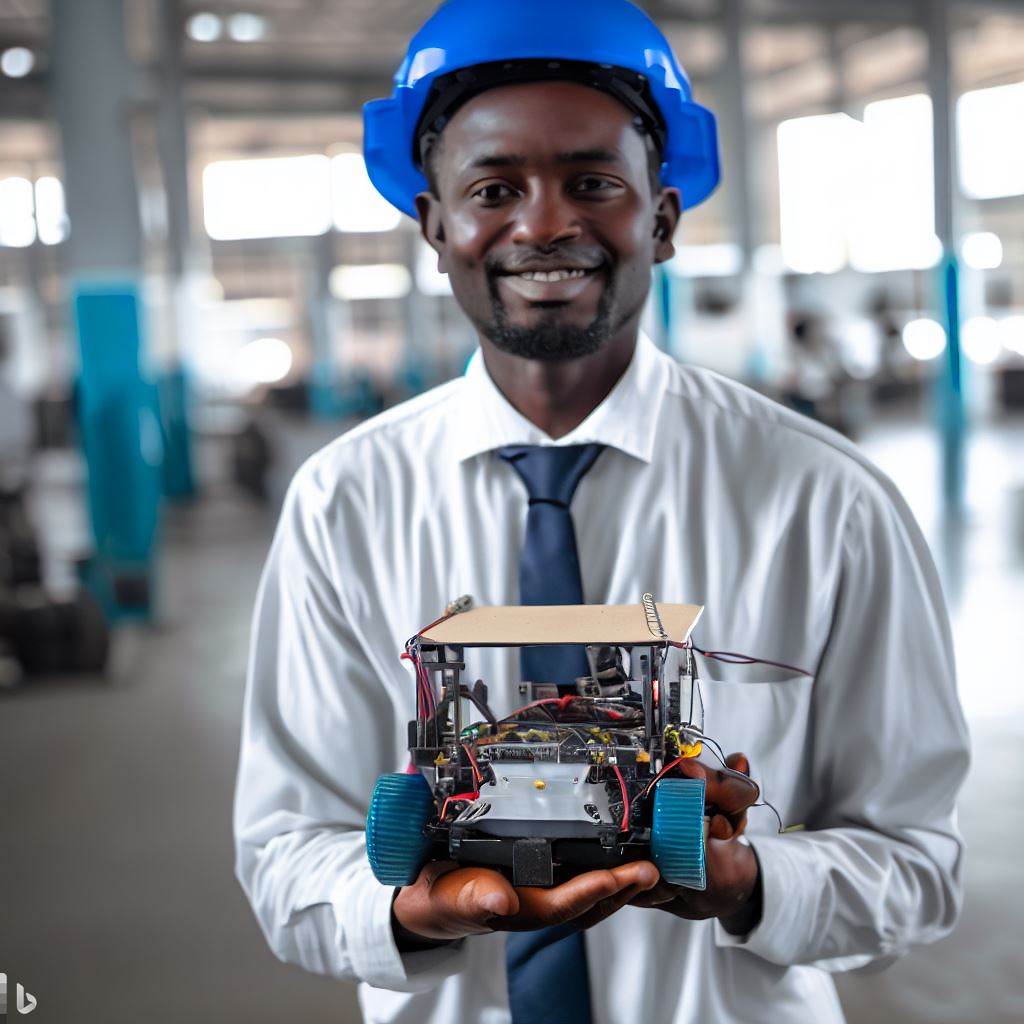Introduction
Mechanical engineering in Nigeria is an evolving field, offering a wide range of opportunities for both men and women. However, women in this industry face numerous barriers that impede their progress and limit their potential.
The patriarchal nature of Nigerian society often discourages women from pursuing careers in traditionally male-dominated fields such as mechanical engineering. The lack of support and mentorship, coupled with societal pressure to conform to gender roles, deters many talented women from entering the field.
Furthermore, the educational system in Nigeria presents challenges for women interested in pursuing a career in mechanical engineering. Limited access to quality education and resources, as well as stereotypes that suggest women are not as intellectually capable as men in technical fields, contribute to the barriers faced by women.
In addition, gender bias and discrimination are prevalent in the workplace, making it difficult for women to thrive and be recognized for their skills and contributions. The underrepresentation of women in leadership positions further exacerbates the issue, as there are few role models for aspiring female mechanical engineers to look up to.
Despite these challenges, there is a growing number of women breaking barriers in mechanical engineering in Nigeria. They are challenging societal norms, pursuing their passion, and excelling in their careers. They serve as inspiration and pave the way for future generations of female engineers.
In this blog post, we will delve into the experiences of these trailblazing women, discuss their achievements and the strategies they employ to overcome barriers.
By highlighting their success stories, we hope to encourage more women to pursue careers in mechanical engineering and inspire positive change in Nigeria’s engineering landscape.
Historical Perspective
In the historical context of women in mechanical engineering in Nigeria, their representation has been low. Women have faced barriers and obstacles in pursuing careers in this male-dominated field.
Historically, societal expectations and stereotypes have limited women’s access to education and opportunities in mechanical engineering. Traditional gender roles and biases have discouraged women from entering technical and scientific fields. Access to education for women in Nigeria has been limited, further contributing to their underrepresentation in mechanical engineering.
Until recently, the field was primarily dominated by men, leaving little room for women to participate.
In the past, women were often discouraged from pursuing careers in mechanical engineering due to societal norms and expectations. Lack of awareness and encouragement led to a significant gender gap in the field.
Women who did venture into mechanical engineering faced stereotypes and discrimination, making it challenging to succeed. Women’s underrepresentation in mechanical engineering hinders girls from considering it as a career. Few role models reinforce the belief that it’s not for women. Past barriers led to a lack of diversity and perspectives. Acknowledge women’s achievements and inspire future generations. Nigeria strives to address the gender imbalance. Programs and initiatives target women in the field. Scholarships and mentorship support aspiring engineers. Raise awareness and challenge stereotypes to attract more women.
Collaborative efforts needed for gender representation. Nigerian women break barriers and foster inclusivity. Inclusion brings fresh perspectives, creativity, and innovation. Women’s participation is vital for the profession’s growth. Breaking down barriers taps into Nigeria’s full female talent potential.
Read: Graduate Schemes for Mechanical Engineers in Nigeria
Challenging Stereotypes and Gender Bias
In a society like Nigeria, stereotypes and gender biases play a significant role in hindering women from pursuing mechanical engineering.
These prejudices and misconceptions not only discourage women but also limit their opportunities and advancements in this field.
Exploring the stereotypes and gender biases that hinder women in pursuing mechanical engineering in Nigeria
Women are not considered as technically adept as men, limiting their chances to succeed in engineering. There is a belief that women lack the physical strength required for mechanical engineering tasks.
Gender roles ingrained in society portray engineering as a male-dominated profession. People assume that women are more suited for nurturing and caregiving roles, rather than technical fields. Many still hold the view that women cannot handle the pressures and challenges that come with engineering.
These stereotypes and biases create a hostile environment for women who aspire to become mechanical engineers. They face doubts and skepticism, often being discouraged from pursuing a career in this field.
Examples of common misconceptions and the impact on women’s careers
- Myth: Women are not skilled in mathematics and physics, fundamental subjects for engineering.
- Reality: Women have equal potential in these subjects, as proven by their performance in academic institutions.
- Myth: Women lack problem-solving abilities necessary for mechanical engineering.
- Reality: Women often exhibit exceptional analytical skills, bringing unique perspectives to engineering problem-solving.
- Myth: Women cannot handle the physical demands of the job.
- Reality: Physical requirements can be efficiently managed through teamwork, technology, and specialization.
- Myth: Women are not fit for leadership roles in engineering.
- Reality: Women possess strong leadership qualities and contribute to diverse and inclusive work environments.
The consequences of misconceptions discourage women from engineering, limiting career opportunities. Representation gaps perpetuate stereotypes and hinder progress.
Raising awareness and providing equal opportunities through mentorship, scholarships, and workshops break barriers.
Supporting young girls’ passion for engineering empowers them to pursue their dreams confidently.
Challenging stereotypes showcases women’s competence, paving the way for future generations.
Gender diversity brings fresh perspectives and innovative solutions, benefiting society.
In Nigeria, addressing stereotypes and biases is crucial to empower women in mechanical engineering.
Acknowledging the impact and implementing initiatives promote equal opportunities and support.
Empower and encourage women in mechanical engineering to break the glass ceiling and create inclusivity.
Read: Challenges Faced by Mechanical Engineers in Nigeria
Women Pioneer in Mechanical Engineering
In the field of mechanical engineering in Nigeria, several notable women pioneers have made significant contributions, breaking barriers, and inspiring future generations.
Their stories and achievements are worth highlighting as their journey opens up possibilities for aspiring women in this male-dominated field.
- Engr. Oluremi Oyo: Oluremi Oyo is a trailblazer in the field of mechanical engineering in Nigeria.
She became the first female mechanical engineer in the country, setting a precedent for women to excel in this field. Her determination and passion have paved the way for many others. - Engr. Edith Ewemade Anekwe: Edith Ewemade Anekwe is another remarkable woman who has made waves in mechanical engineering in Nigeria.
She became the first female President of the Nigerian Society of Engineers, breaking through the glass ceiling and proving that women are equally capable. - Engr. Margaret O. Ajadi: Margaret O. Ajadi has left an indelible mark on the field of mechanical engineering.
With her extensive knowledge and expertise, she became the first female Associate Dean of Engineering at the University of Lagos, inspiring countless young women to pursue their dreams fearlessly. - Engr. Adebimpe Alatise: Adebimpe Alatise is known for her groundbreaking work in the field of material science and engineering.
Her research on renewable energy technologies has pushed the boundaries of what is possible and has put Nigeria on the map in terms of sustainable development. - Engr. Mary Ivoke: Mary Ivoke has broken barriers in the sector by becoming the first female Senior Engineer at the Nigerian National Petroleum Corporation (NNPC).
Her achievements serve as a shining example to young women that they can thrive in male-dominated industries.
These women pioneers achieved remarkable feats, breaking barriers, inspiring future female engineers in Nigeria.
Read: Nigerian Universities for Aspiring Mechanical Engineers
Initiatives and Organizations Advancing Women in Mechanical Engineering
In Nigeria, there are several initiatives and organizations that are actively working towards the empowerment and advancement of women in the field of mechanical engineering.
These initiatives aim to break barriers and provide opportunities for women to thrive in a male-dominated industry.
Women in Mechanical Engineering Association (WIMEA)
WIMEA is a non-profit organization that focuses on promoting and supporting women in mechanical engineering. They organize workshops, seminars, and conferences to provide a platform for networking and knowledge exchange.
WIMEA also offers mentorship programs and scholarships to encourage young girls to pursue careers in mechanical engineering. Their work has led to a significant increase in the number of women studying and working in the field.
Girls in Engineering, Mathematics, and Science (GEMS)
GEMS is a program that specifically targets girls in secondary schools to spark their interest in STEM fields. They organize interactive sessions, hands-on experiments, and career guidance workshops.
GEMS also partners with universities and industry professionals to offer mentorship and internship opportunities for girls interested in mechanical engineering. The program has helped to increase the enrollment of girls in mechanical engineering courses in universities across Nigeria.
Nigerian Society of Engineers (NSE) Women Engineer’s Forum
The NSE Women Engineer’s Forum is a subgroup within the Nigerian Society of Engineers. They focus on the professional development, mentoring, and networking of women engineers, including those in mechanical engineering.
The forum organizes technical conferences, training programs, and leadership workshops for women engineers. They also collaborate with other professional bodies to advocate for policies that promote gender equality in the industry.
Sisters United in Science and Engineering (SUSE)
SUSE is a support group that brings together women studying mechanical engineering in Nigerian universities. They provide a platform for mentorship, knowledge sharing, and emotional support to overcome challenges faced by women in the field.
SUSE organizes regular meetings, study groups, and career development sessions to empower its members.
They have become a strong community that encourages and inspires women to excel in mechanical engineering. These initiatives and organizations have made significant strides in advancing women in mechanical engineering in Nigeria.
Their efforts have not only increased the number of women pursuing careers in the field but also created a supportive environment for their professional development. Through mentorship, networking, and exposure to opportunities, these initiatives have helped women overcome the barriers they face and succeed in a traditionally male-dominated industry.
Their impact can be seen in the growing number of women occupying leadership positions and making significant contributions to the field of mechanical engineering in Nigeria.
As Nigeria continues to strive for gender equality, these initiatives and organizations play a crucial role in breaking down barriers and creating a more inclusive and diverse workforce in mechanical engineering.
Read: The Role of Mechanical Engineers in Nigerian Industries

Educational Reforms and Opportunities
Educational reforms play a crucial role in promoting gender equality within the field of mechanical engineering education.
By implementing changes in the educational system, Nigeria can create a more inclusive environment for women. These reforms should focus on providing equal opportunities for both male and female students.
Importance of Educational Reforms
- Encourages female students to pursue careers in mechanical engineering.
- Breaks down gender stereotypes and biases within the field.
- Promotes a diverse and inclusive learning environment.
- Enhances the quality of education by including different perspectives and ideas.
- Addresses the gender pay gap by improving access to higher-paying jobs.
One of the key strategies to promote gender equality in mechanical engineering education is through scholarships, grants, and opportunities specifically designed for women.
Availability of Scholarships, Grants, and Opportunities
Numerous organizations and institutions in Nigeria offer scholarships exclusively for women in engineering.
These scholarships aim to encourage more women to pursue higher education and careers in mechanical engineering. They provide financial support to cover tuition fees, accommodation, and other related expenses.
Some prominent scholarships include:
The Association of Professional Women Engineers in Nigeria (APWEN) Scholarship
APWEN awards scholarships to female undergraduate students studying engineering courses, including mechanical engineering. This scholarship covers tuition fees, textbooks, and a monthly stipend.
It also offers mentorship and internship opportunities to recipients to enhance their practical skills.
MTN Foundation Scholarship Scheme for Science and Technology Students
This scholarship program supports both undergraduate and postgraduate female students pursuing science and technology-related fields, including mechanical engineering.
It provides full funding for tuition fees, books, accommodation, and a monthly stipend. Recipients also receive career development and leadership training.
Shell Nigeria Niger Delta Postgraduate Scholarship Scheme
The scholarship aims to promote local capacity in the Niger Delta region by providing opportunities for women to pursue postgraduate studies in various engineering disciplines.
Mechanical engineering is one of the eligible fields for this scholarship. It covers tuition fees, research expenses, and a monthly stipend. These scholarships not only support women financially but also empower them to overcome the barriers they face within the field.
Furthermore, it is essential to create mentorship programs where successful women engineers can guide and inspire young female students. These programs help build a support network and provide invaluable advice and guidance. Mentors can share their experiences, offer career guidance, and help female students navigate the challenges they may encounter.
In fact, educational reforms are vital for promoting gender equality in mechanical engineering education in Nigeria. These reforms should focus on providing equal opportunities and creating an inclusive environment for all students.
Additionally, scholarships, grants, and mentorship programs play a crucial role in supporting and empowering women in this field.
By working together and addressing the barriers women face, Nigeria can break down these barriers and promote the participation of women in mechanical engineering.
Challenges and Opportunities for Women in Mechanical Engineering
Existing Challenges Faced by Women in Mechanical Engineering in Nigeria
- Stereotypes: Women often face stereotypes that undermine their abilities and suitability for the field.
- Limited Access to Education: Inadequate access to quality education and technical training restricts women’s entry into mechanical engineering.
- Gender Bias: Prevalent gender bias within the industry leads to discriminatory practices and unequal opportunities.
- Lack of Role Models: A scarcity of female role models in mechanical engineering discourages aspiring women from pursuing careers in the field.
- Hostile Work Environment: Some women encounter a male-dominated work culture, including harassment and exclusionary practices.
Opportunities Available for Women to Thrive and Contribute to the Field
- Education and Training Initiatives: Government and private organizations can invest in initiatives that provide technical education and training opportunities for women.
- Promoting Gender Equality: Encouraging gender equality in educational institutions and workplaces can improve opportunities for women in mechanical engineering.
- Creating Support Networks: Establishing networks and mentorship programs that connect women in the field can offer guidance and support.
- Encouraging Female Leadership: Encouraging women to take on leadership roles within the mechanical engineering industry can inspire others and break stereotypes.
- Research and Development Funding: Allocating funding specifically for women-led research and development projects promotes their contributions to the field.
- Awareness and Outreach Programs: Conducting awareness campaigns and outreach programs can inform and inspire young girls to consider mechanical engineering careers.
- Addressing Bias and Discrimination: Implementing policies and initiatives to address gender bias, discrimination, and harassment in the workplace can create a more inclusive environment.
In general, while women in mechanical engineering often face challenges including stereotypes, limited access to education, gender bias, lack of role models, and a hostile work environment, numerous opportunities exist for them to thrive and contribute to the field.
Addressing challenges through education, gender equality, and support networks can make the industry more inclusive. Embracing diverse perspectives benefits mechanical engineering.
The Importance of Diversity in Mechanical Engineering
In today’s rapidly evolving world, the field of mechanical engineering is gaining more recognition for its significant role in technological advancements.
As diversity and inclusion take center stage in various industries, it becomes crucial to emphasize their importance in mechanical engineering as well.
Here, we explore the benefits of having more women participating and leading in the industry.
Bringing Different Perspectives
Women bring unique perspectives and experiences to the table, leading to innovation and fresh ideas. Diverse viewpoints foster creativity, problem-solving, and result in more effective engineering solutions.
By increasing women’s representation, we can tap into a vast pool of untapped talent and intellectual capital.
Enhancing Collaboration
A diverse workforce improves collaboration by promoting the exchange of ideas and fostering a more inclusive work environment.
Women can offer alternative approaches to problem-solving and contribute to a more comprehensive decision-making process.
Creating a culture of inclusivity allows teams to leverage the strengths and skills of everyone involved.
Addressing Consumer Needs
Having women in the industry helps bridge the gap between engineering design and consumer preferences.
Women can bring valuable insights into product development, ensuring designs are more user-friendly and meet diverse needs.
Mechanical engineering solutions that consider various perspectives are more likely to resonate with a wider customer base.
Inspiring Future Generations
Increased representation of women in mechanical engineering serves as a powerful inspiration for young aspiring engineers. Visible role models demonstrate that gender should never be a barrier to pursuing a career in the field.
By encouraging diversity, we can attract more young women to explore the possibilities of studying engineering.
Promoting Workplace Equality
A diverse workforce not only benefits the industry but also promotes fairness and equality within the workplace. Women deserve equal opportunities for growth, leadership, and recognition in the field of mechanical engineering.
Through gender diversity, we can break down stereotypes and advance towards a more balanced and inclusive industry.
Promoting Global Competitiveness
By embracing diversity, the mechanical engineering industry can foster a more competitive and adaptable workforce.
Companies that prioritize inclusivity are often more successful in attracting and retaining top talent. Globalization demands a workforce that can understand and cater to the needs of diverse markets.
To sum it up, diversity and inclusion are not just buzzwords but integral components for the future success of mechanical engineering. By emphasizing the significance of diversity and encouraging more women to participate and lead in the industry, we can unlock immense potential and drive innovation.
Embracing diversity in mechanical engineering will result in more effective solutions, foster collaboration, and inspire future generations to pursue careers in this exciting field.
Conclusion
Women in Nigeria have made significant progress in breaking barriers in the field of mechanical engineering.
Despite facing numerous challenges, their determination and resilience have paved the way for more women to pursue careers in this male-dominated industry. It is crucial to encourage and inspire young women to consider careers in mechanical engineering.
They possess the potential and ability to contribute greatly to the field, bringing fresh perspectives and innovative solutions to complex engineering problems. In order to achieve true gender equality in mechanical engineering, it is important for organizations, institutions, and individuals to actively support women in this field.
This can be done through providing mentoring programs, scholarships, and opportunities for professional growth. The call to action is clear we must work together to eliminate gender biases and create an inclusive environment where women can thrive.
By supporting women in mechanical engineering, we can ensure that their voices are heard, their talents are recognized, and their contributions are valued.
Lastly, breaking barriers in mechanical engineering is not only a matter of gender equality but also a means of promoting innovation and progress.
It is time to continue empowering women and shaping a future where they play a significant role in shaping the field of mechanical engineering in Nigeria.




